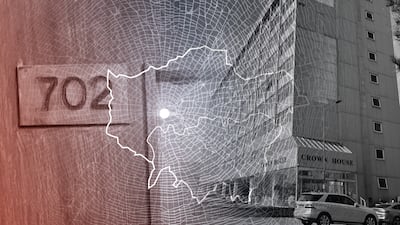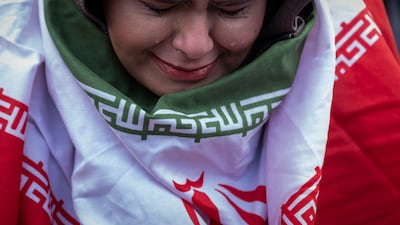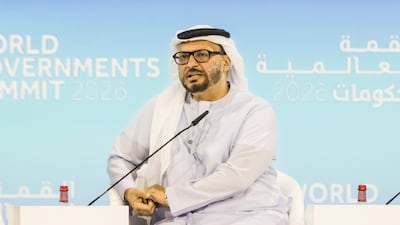
Hello from The National and welcome to the View from London – your weekly guide to the big stories from our London bureau
Hiding in plain sight
No company logos or branding give a hint to what lies on the other side of the locked door, shut against prying eyes and displaying no sign of life.
Suite 702 at Crown House sits off London's North Circular Road, yet it has a particular claim to fame: the address appears repeatedly in US and regional sanctions lists.
The nondescript space in a rundown part of the British capital is home to a matrix of people and companies – some active; others dormant or dissolved – placed under sanctions by the US and other countries as extremists. The office has links to the Muslim Brotherhood and Hamas.
That Crown House could be a reported location of the Muslim Brotherhood is a product of how the organisation has grown and spread over decades. Its playbook is a swirl of corporate registrations and interlocking directorships, not least at this place.
Zaher Birawi is alleged by the US Treasury to be a senior official and founding member of the Popular Conference for Palestinians Abroad, in a recent sanctions announcement. Mr Birawi is also a director and owner of Asira Media and Public Relations, whose office address is Suite 702. He is also a trustee of Education Aid for Palestinians, which is also registered at the address. He rejects the US designation.
Ahmed Al Nuaimi owns six businesses registered at Crown House, and has alleged links with the highest echelons of the Muslim Brotherhood. There is no suggestion that the building management has any knowledge of the tenants' business activities. One of Al Nuaimi’s businesses registered at Crown House is a film company named Ima6ine, which was founded in 2016 and was also the subject of sanctions last year.

According to its Facebook profile, which features images of film crew in branded sweatshirts on set, Ima6ine is “one of the most imaginative independent film production companies in the UK”.
Ima6ine made three films, including 100 Balfour Road – a 12-minute work that is a metaphor for the Israel-Palestine conflict.
The film can be viewed on the YouTube channel of the Palestinian Return Centre, whose website says it is an advocacy group for refugees focused on the aftermath of the Nakba of 1948 and that it is not affiliated with any political party or movement.
The Palestinian Return Centre's website also states 100 Balfour Road was produced for it by Ima6ine.
Our full investigation into the tentacles that reach across continents from this most unlikely of spots can be read here.
Lenders' rebirth
A funny thing happened on the way to global financial disruption. Former UN deputy secretary general Mark Malloch Brown sees a way forward for the rebirth of key international institutions the World Bank and the International Monetary Fund.
The former British official's starting point to rejuvenating the organisations will be a priority of a sizeable number of countries seeking alternatives to choosing between competing global power blocs.
These two bodies and their ancillaries can trace their roots to a meeting held in 1944 in Bretton Woods, in the White Mountains of the US state of New Hampshire.
A report co-written by Mr Malloch Brown and presented at a recent ODI Global event examines the dramatic break with that Bretton Woods order since the election of US President Donald Trump. International aid has been slashed, for example. “The provision of grants from wealthier countries to poorer ones has lost political support, becoming another casualty of the collapse of global solidarity. This shift places greater pressure on lending institutions, rather than grant-making ones, to fill the gap,” the document argues.
Yet rising questions over established international alliance structures, dollar dominance and the rise of alternative credit systems in many ways enhance these institutions’ roles as the last resort.
The World Bank and the IMF have most scope for a comeback because of their position between the international money markets and developing countries. Mr Malloch Brown told me of the hunger that exists for solutions from countries that “want the freedom to make their own political choices”.
These competing pressures also create momentum for rapid change. This, Mr Malloch Brown says, means there is greater scope for countries to own their development finance plans.
Iran ban
Britain has rejected demands to back regime change in Iran after the bloody protests at the turn of the year, even as a head of steam has built over banning its repressive Islamic Revolutionary Guard Corps.
The build-up of American forces in the region has led to discussion that US President Donald Trump might order the toppling of the Tehran government.
But Foreign Office minister Hamish Falconer told the UK Parliament on Tuesday that he did not “want to be drawn into speculating about regime change in Iran”.
Calls from MPs wanting the IRGC to be proscribed as a terror organisation came thick and fast on Tuesday. Reports that it played a major role in killing up to 30,000 demonstrators last month fuelled MPs' interventions.
Many made the point that Britain was taking too long to enact the legislation, especially after the EU, US, Australia and Canada had all proscribed it.
Foremost among them was the former chairman of the intelligence and security committee, Julian Lewis, who said there was “an analogy between the IRGC and the Gestapo and Hitler's SS”. He asked the government to take action accordingly.
Read more
The National produces newsletters across an array of subjects. You can sign up here. To receive The Editor's Briefing, our Editor-in-Chief's weekly newsletter that rounds up the top stories, sign up here.


